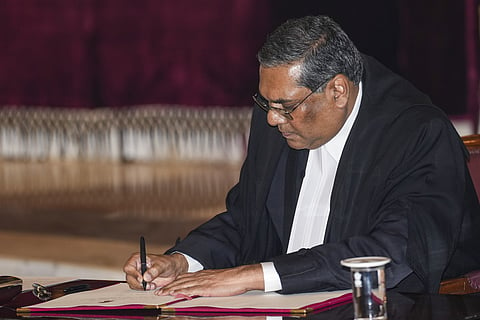

NEW DELHI: Justice Sanjiv Khanna heard 45 cases on his first day as the 51st Chief Justice of India (CJI), and thanked lawyers and bar leaders for wishing him well.
CJI Khanna entered the hallowed CJI's courtroom around noon after being sworn by President Droupadi Murmu in a brief ceremony at the Rashtrapati Bhavan.
He received a rousing welcome by the bar leaders, lawyers including former attorney general and senior advocate Mukul Rohatgi.
"I wish you a fruitful tenure as the CJI," wished Rohatgi.
On Friday, Rohatgi had said that after more than a decade and CJI Y K Sabharwal (late), the top court will have another CJI from the Delhi High Court.
Other lawyers present in the courtroom also wished the CJI well.
"Thank you," said CJI Khanna, who assembled in courtroom 1 along with Justice Sanjay Kumar minutes after noon.
When a bar leader raised an issue relating to sequencing of cases listed in a day for hearing, the CJI said it was in his mind and he will consider it.
The CJI held the court till 2.30 pm and heard 45 listed matters, mostly commercial disputes.
In one of the pleas filed by the West Bengal government against an arbitral award, the CJI said, "The citizens cannot be taken for a ride." The CJI-led bench refused to entertain the appeal of the state government against the arbitral award that had asked it to pay a Mauritius-based company towards promised tax incentives.
CJI Khanna took the oath in English "in the name of God". Justice Khanna will serve a term of just over six months until May 13, 2025, succeeding Justice D.Y. Chandrachud, who retired after a two-year tenure. Justice Chandrachud had recommended Justice Khanna, the senior-most judge, as his successor on October 17.
Vice President Jagdeep Dhankhar, Prime Minister Narendra Modi, Defence Minister Rajnath Singh, Union Law Minister Arjun Ram Meghwal and former CJIs Chandrachud and J S Khehar were among those present on the occasion.
Born on May 14, 1960, Justice Khanna graduated in law from Delhi University’s Campus Law Centre and joined the Bar Council of Delhi in 1983. His career spanned diverse fields, including constitutional law, direct taxes, arbitration, commercial law, land laws, environmental law, and medical negligence. He served as Senior Standing Counsel for Delhi’s Income Tax Department and later as Delhi’s Standing Counsel for civil law matters.
In 2005, Justice Khanna was appointed as an additional judge of the Delhi High Court and became a permanent judge in 2006. He contributed to judicial development through associations with the Delhi Judicial Academy, the Delhi International Arbitration Centre, and district court mediation centres.
Appointed to the Supreme Court in January 2019 by President Ram Nath Kovind, Justice Khanna has authored over 117 judgements and served on 456 Benches, notably in criminal, civil, constitutional, and arbitration matters. Among his key judgements:
Electoral Bond Scheme (2024): Justice Khanna authored a concurring opinion in declaring the scheme unconstitutional, addressing privacy concerns for donors and emphasising transparency in the voting process.
Association for Democratic Reforms v Election Commission of India (2024): He rejected ADR’s plea seeking 100 percent VVPAT verification of votes cast on Electronic Voting Machines. He wrote that he wished to put on record all safeguards adopted by the ECI to ensure free and fair elections.
Article 370 Abrogation (2023): In a landmark opinion, Justice Khanna upheld the abrogation of Article 370, interpreting it as a feature of asymmetric federalism rather than sovereignty.
On October 24, 2024, the Union Government notified his appointment as the next CJI.